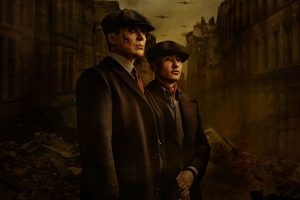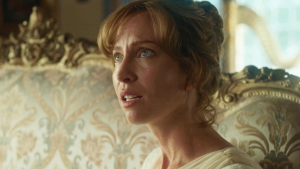
While acclaimed 70s directors like Martin Scorsese and Steven Spielberg continue to receive plenty of fanfare about their work and careers, existing quietly and steadily alongside them has been Ridley Scott. Scott got started at the same time as the rest of New Hollywood, but he existed outside of that creative wave, working within the British film industry even as he utilized Hollywood funding. Perhaps for that reason he’s not gotten quite as much attention, even as he has continued to direct film after film into his mid 80s.
The more uneven quality of his work hasn’t helped his reputation. Napoleon is certainly an exemplar of the word “uneven.” While it is a beautifully filmed work with lovely shots and austere costuming and set design, Napoleon is like its titular protagonist in that it oftentimes falls short of the ambitious grasp it attempts.
A biopic covering the famed world leader’s rise to power and subsequent fall, Scott’s film lurches along at a mammoth 157 minutes. Unwieldy in its storytelling, the film fails to present a compelling character study of a fascinating historical figure. In fact, it is hard to discern much of any driving force behind the film’s events past vague notions that Napoleon (Joaquin Phoenix)’s secret driving ambition was the love of his one-time wife Josephine (Vanessa Kirby). But even this theme is under-developed, more told and spoon-fed to the audience than shown. There are also minor developments that explore the arrogance and potential esteem issues that drove Napoleon, but the film’s bloated storytelling prevents those from ever resonating.
Scott is more intent on presenting his wry, darkly humorous spin on history. Admittedly, there are a number of funny moments throughout the film, including Napoleon crawling around on all fours snorting like a pig, a drummer comedically getting blown apart by a cannon-ball (a horse is also graphically killed in a similarly funny manner), and Napoleon later sadly insisting on his version of history’s events despite schoolchildren knowing better. Casualty numbers of Napoleon’s battles often flash on screen after the battle scenes, as if to comically suggest that Napoleon’s victories aren’t as great as imagined. This sarcastic approach makes it seem like the film is trying to lampoon its lead character, but that too is underdeveloped.
One would hope that the lead performers would at least provide some elevation in this biopic. But sadly, neither Phoenix nor Kirby manage to shine. That’s not to say they are bad. Far from it. But these are not the tour de force performances one might hope for based on the trailers. The film calls on Phoenix and Kirby to play cool and stoic too often to leave a deep impression. Phoenix’s best moments are when he’s called on to be comedic and ridiculous. Kirby, meanwhile, is usually plays the sadly suffering woman, aside from a couple of scenes where she bites and fights back.
Lest one think this review is all negative, there is plenty to praise about Napoleon. The battle sequences are excellent. They demonstrate the tactical genius of Napoleon quite well, and you feel your pulse pound as he maneuvers his troops into a winning position. History buffs will love the minor details of the British infantry square being used at Waterloo, how scouts communicated troop positions, and appearances from a number of famous French leaders and other world history figures. The detailing of the costumes and sets makes each frame a delight to look at. There’s little doubt Ridley Scott is a master of his craft when it comes to the tools of filmmaking.
His film just needed far more work on the storytelling and character-building aspects. Whether that’s because of the writing or because the edit needed to chop things down and deliver more storytelling momentum, Napoleon had work yet to do. Scott’s film does not ring as a definitive telling of the famed figure’s life, however much he may have aspired to create that.







